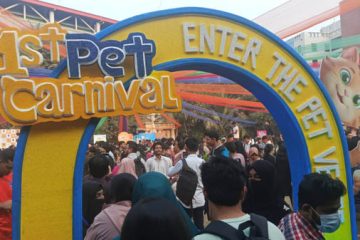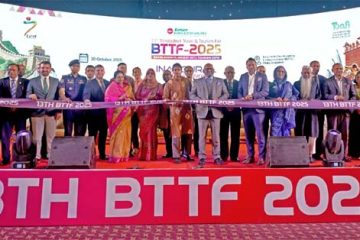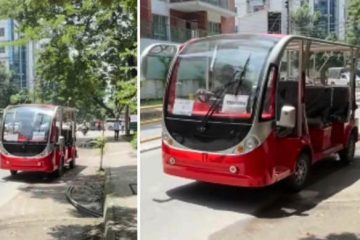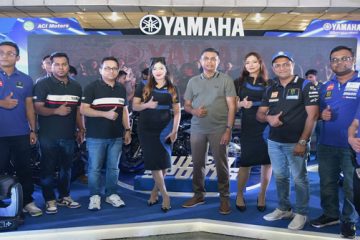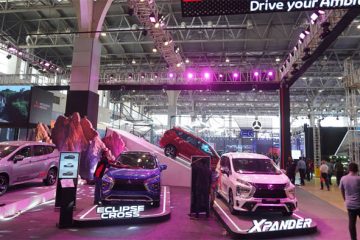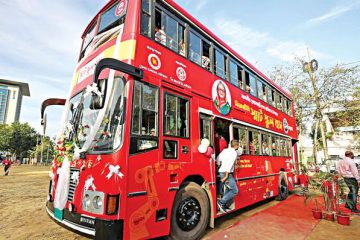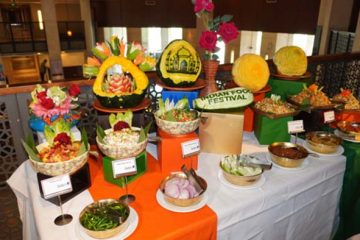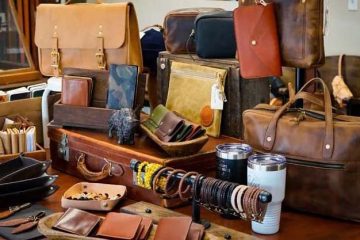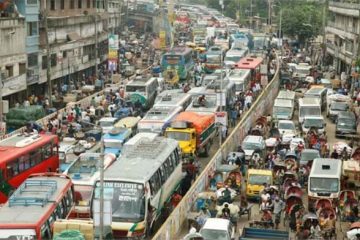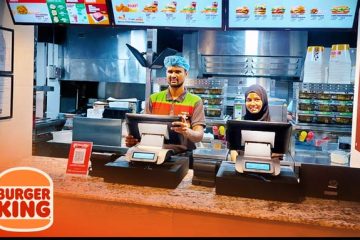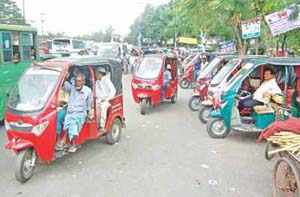 Hundreds of unauthorised commercially run electric three-wheelers have flooded Chittagong city, consuming a substantial amount of electricity daily from the national grid.
Hundreds of unauthorised commercially run electric three-wheelers have flooded Chittagong city, consuming a substantial amount of electricity daily from the national grid.
Mainly two types of electric vehicles, motor-rickshaws and easy-bikes, ply the city roads. The motor-rickshaws are similar to ordinary paddle rickshaws but with a battery-run motor set under the body and are powered by four rechargeable batteries. On the other hand, the easy-bikes look somewhat like CNG-run auto-rickshaws but are powered by five rechargeable batteries.
Power Development Board (PDB) sources said each of the auto-bikes, which have to be charged eight hours daily, consumes 7-8 units of electricity when a motor-rickshaw consumes around 2-3 units every day. Together the vehicles use more than 4,000 units of electricity a day, which cost no less than Tk 30,000 or monthly Tk 9 lakh.
Samaresh Kumar Biswas, deputy director of Bangladesh Road Transport Authority (BRTA), Chittagong, said all motor vehicles need six types of documents to be on roads but the motor-rickshaws and easy-bikes had none. “These vehicles are illegal and we are asking people not to use them,” he told The Daily Star.
Leaders of the easy-bike owners’ association and showrooms of motor-rickshaws revealed that around 500 easy-bikes and 300 motor-rickshaws are regularly plying in the city. Only in the Katgor circle, more than 300 easy-bikes ply five different routes, they said.
“The association takes Tk 5000 from an owner initially to be listed for the route. Thereafter, there are a monthly charge of Tk 250 and a daily charge of Tk 10 to bear various costs to keep the vehicles on the road, including managing the law enforcers,” said Elias Mia, a driver of Katgor area.
Many other drivers shared the same information. So did Kamal Uddin, leader of Easy-bike Owners Association, when this correspondent talked to him pretending to be a new auto-bike owner.
The motor-rickshaws, however, do not have any owners’ association. They have to pay police through the showrooms from which they buy the vehicles, said Md Monir, owner of Dhaka Auto Rickshaw, situated in Patenga sea beach area. A motor-rickshaw owner has to pay Tk 300 per month to keep the police content, he added.
Although the owners and drivers have to pay different quarters to ensure that the vehicles stay on the road, they earn a pretty good amount as they get a huge number of passengers mainly because of cheap fare. For a trip to the sea beach from Katgor, a rickshaw charges Tk 30 while an easy-bike takes only Tk 10.
But each of these shaky vehicles carries nine passengers when they are made to seat only five, including the driver, said commuters.
Saiful Islam, a resident of Chawkbazar and regular user of the bikes, said, “Though these vehicles charge less, they are not comfortable to ride. You have to cram into an easy bike, as it does not go without picking up nine people.”
Only a few of the vehicle owners recharge their vehicles at home. The recharging is mostly done in several garages that have been set up with the required facilities in the neighbourhoods where the vehicles run.
Locals complained that these recharging stations use electricity connections illegally.
Jafar Alam, a resident of Controler Mor area, said most of the recharging takes place at night, illegally using electricity from different electric posts. “Because of this illegal power consumption, we have to suffer from load-shedding.”
BRTA official Samaresh Kumar Biswas said BRTA faces too terrible a manpower crisis to conduct drives. He also said it is the responsibility of police to check whether the vehicles have required documents. “If the law enforcers carry out their duties properly, no vehicle can run without required documents,” he said.
PDB Chief Engineer Md Raisuddin Sarker admitted that PDB incurs losses for the illegal consumption of electricity by these vehicles. “We would soon conduct drives to identify the garages and vehicles that use illegal connections, and would take legal actions accordingly,” he said.
Police denied taking bribes from the illegal vehicle owners but admitted that some vehicles are plying in the city. “I do not know anything about police involvement in taking money from the owners of these vehicles,” said Tanvir Arafat, assistant deputy commissioner of Chittagong Metropolitan Police (traffic). “We do not allow these illegal vehicles on the city roads. On an average, we seize 8-10 easy-bikes and as many motor-rickshaws every day.”
Courtesy of The Daily Star

